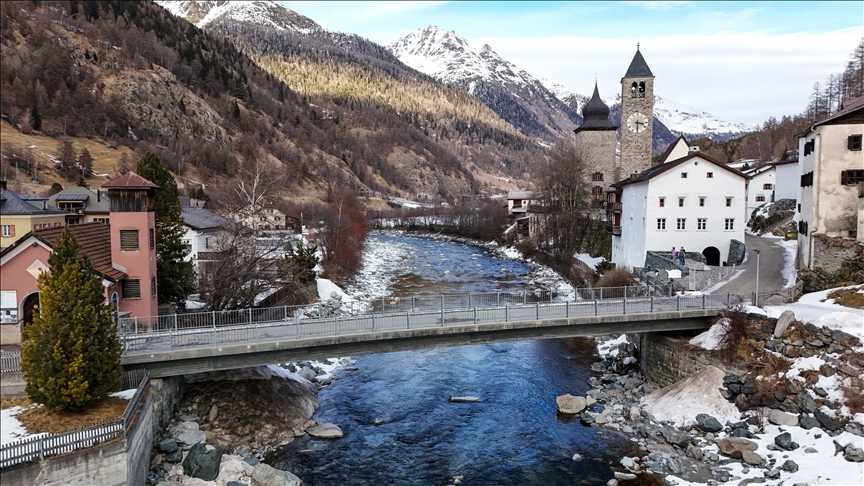Alpine ice in retreat: Switzerland’s glaciers shrink rapidly amid global warming
Once vast rivers of ice, many are now retreating so fast that what was short walk from Rhône Glacier’s parking area 35 years ago is now half-hour trek, says director of Glacier Monitoring in Switzerland (GLAMOS)

ISTANBUL
Switzerland’s glaciers are shrinking at an unprecedented pace as global warming accelerates their retreat.
Once vast rivers of ice, many are now retreating so fast that what was a short walk from the Rhône Glacier’s parking area 35 years ago is now a half-hour trek, said Matthias Huss, director of Glacier Monitoring in Switzerland (GLAMOS), according to the BBC on Sunday.
The glacier melt is part of a global pattern. A report by the World Meteorological Organization said that in 2024, glaciers outside Greenland and Antarctica lost 450 billion tons of ice—the equivalent of a 7km cube of ice, enough to fill 180 million Olympic swimming pools.
Switzerland’s glaciers have suffered heavily, shedding a quarter of their ice over the last ten years.
Satellite photos reveal that the Rhône Glacier now terminates in a lake that was once solid ice, and smaller glaciers, such as the Pizol in the north-east Alps, have vanished entirely.
Until recently, a 2% annual loss of ice in the Alps was considered extreme. In 2022, Switzerland lost nearly 6% of its remaining glacier ice, followed by significant losses in 2023, 2024, and 2025.
Even the Alps’ largest glacier, the Great Aletsch, has retreated about 2.3km (about 1.4 miles) over the past 75 years, with trees now growing where ice once flowed.
While glaciers have naturally advanced and retreated over centuries, scientists emphasize that the rapid pace of recent losses is driven by human-caused climate change.
Glaciers will continue to shrink even if global temperatures stabilize, because their melt lags behind climate shifts.
"A large part of the future melt of the glaciers is already locked in," stated Prof Ben Marzeion from the Institute of Geography at the University of Bremen.
"They are lagging climate change," Marzeion added.
Limiting global warming to 1.5°C above pre-industrial levels could preserve half of the remaining mountain glacier ice, while a rise of 2.7°C could result in the eventual loss of three-quarters.
This retreat poses serious risks for water resources. Glaciers function as natural reservoirs, providing meltwater for rivers, irrigation, hydropower, and drinking water.
The impact is particularly severe in Asia’s “Third Pole,” where roughly 800 million people depend on glacier-fed rivers.
Despite the grim outlook, scientists see a path forward.
"It's sad. But at the same time, it's also empowering. If you decarbonise and reduce the [carbon] footprint, you can preserve glaciers. We have it in our hands," said Professor Regine Hock, from the University of Oslo.





